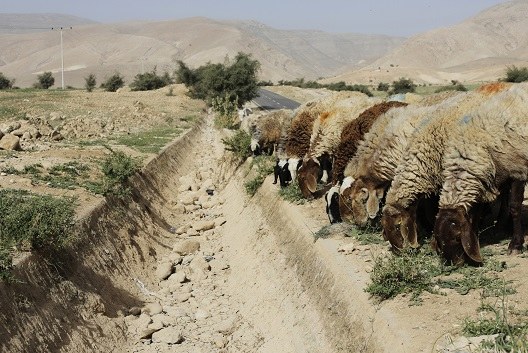Middle East needs region-wide plan to tackle climate change

https://arab.news/48qb9
As western Canada and the northwestern US melt under a heat dome and as record temperatures are recorded in the Arctic, the climate change deniers should be in full retreat. The scientific evidence is overwhelming that man-made climate change is occurring and that the consequences are serious and global. Since the start of the Industrial Revolution, the global average temperature has increased by more than 1 degree Celsius.
But what about the Middle East and North Africa region? It too has recorded record temperatures in recent years, rendering certain areas almost uninhabitable. This year, the mercury hit 49 C earlier than ever before. Iran and Iraq have suffered electricity blackouts in this summer heat. Climate change and environmental degradation bring with them huge challenges, from rising sea levels and the salinization of coastal areas to desertification, dust storms, and water and air pollution. The Arab world is home to a third of the world’s deserts and these areas are growing, with land degradation a serious threat to many countries that are reliant on agriculture.
Issues relating to the environment have featured in protest movements, notably in Iraq and Lebanon. The water in Basra is dangerously contaminated and toxic, so much so that 118,000 people suffered from poisoning in September 2018. Among the contaminants are depleted uranium munitions from earlier wars, as well as industrial and oil pollutants. And everyone remembers Lebanon’s great garbage crisis, which started in 2015, while even today waste is regularly burned in the open air, releasing yet more dangerous toxins.
The Middle East remains the most water-stressed region in the world. Unsustainable groundwater extraction has led to massive stresses on water, even without climate change. Every single country in the region is experiencing a decline in groundwater reserves, not least Iraq, Kuwait, Syria and Lebanon. Turkey is enduring its worst drought in a decade. None of this is made any easier by huge increases in population, which is arguably a bigger factor in water stress than climate change.
Dams have ensured massive flow reduction in major rivers including the Nile, Tigris and Euphrates. This has altered the whole hydrological map of these great river basins. Both the Syrian regime and the Syrian Democratic Forces have blamed Turkey for a huge decline in the flow of the Euphrates, which has led to electricity cuts, an increase in the levels of salinity and pollutants, and a reduction in fish stocks.
Academics have debated the likelihood of water wars for years. The reality is that water stress and climate change have not yet caused conflicts, but they have exacerbated them. Many argue that a drought in Syria caused the uprising in 2011, but it was merely a catalyst. The overwhelming cause remains the actions of the Syrian regime, including its brutality and corruption.
But what will happen in the Nile Delta, which is home to two-thirds of Egypt’s population? The city of Alexandria is sinking and the Nile Delta is shrinking. The Intergovernmental Panel on Climate Change determined that it was of the three areas on the planet most vulnerable to a rise in sea levels.
There are also smaller impacts that hit specific areas. In Lebanon, the western conifer seed bug, native to the US, has flourished due to climate change and has devastated the pine seed industry.
Renewables are vital. Solar energy offers major opportunities to a country like Jordan, which imports about 97 percent of its energy needs. The regret is that the Middle East, perhaps overconfident in its hydrocarbon wealth, did not invest in solar back in the 1990s, when it could have played a leading role in solar technology. The dividends would have been immense. That said, investment in renewables is progressing now. Many oil-producing states hope to use renewables to satisfy domestic power consumption, enabling them to export more oil and gas. According to one Finnish study, Saudi Arabia could transition to be powered only by renewables as early as 2040. Morocco, which imports 90 percent of its energy needs, has also invested in wind technology. By 2030, renewables should make up more than 30 percent of its power production. Energy storage will be a vital hurdle to clear.
As with most areas of the world, the accusation that state and regional authorities have been slow to act carries significant weight. Certain states have acted individually, but not as a collective. Just like when fighting the pandemic, this is the only effective way of handling the crisis — and it is a crisis, if not an emergency.
Working together is the only effective way of handling the crisis — and it is a crisis, if not an emergency.
Chris Doyle
Middle Eastern states need to work harder on investing in their own technologies. They need to cooperate to be effective, as climate change knows no borders. So far, despite expressed intentions, Middle Eastern states have acted on their own, not as part of a regional plan. They could start by improving scientific and technical cooperation, as well as information sharing. They could also adopt better water management systems and end wasteful approaches that effectively subsidize the cost of water. They could challenge the dangerous levels of overgrazing and deforestation that assist the process of desertification.
Planning for and mitigating climate change is also vital. What happens when conditions lead to large movements of people, away from coastal regions that are under threat, for example? Without any planning, this will lead to social disorder, chaos and bloodshed.
But Middle Eastern states should also expect, as with the pandemic, considerable assistance from the richer powers that, in this case, have done the most damage to the climate. Finance and technological expertise has to be shared. Let us hope that, at the UN Climate Change Conference (COP26) in Glasgow in November, a spirit of determined collective action can inspire a truly global response. The Middle East must not be left behind; in fact, it should be at the forefront of such actions.
- Chris Doyle is director of the London-based Council for Arab-British Understanding. Twitter: @Doylech










































